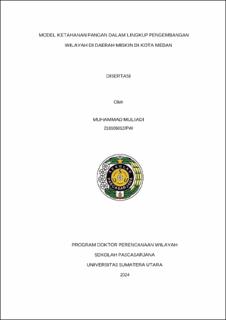Model Ketahanan Pangan dalam Lingkup Pengembangan Wilayah di Daerah Miskin di Kota Medan
Food Security Model in The Scope of Regional Development at Slum Areas in Medan

Date
2024Author
Muliadi, Muhammad
Advisor(s)
Lubis, Satia Negara
Harahap, Hamidah
Slamet, Bejo
Metadata
Show full item recordAbstract
Poverty is a complex issue that poses as one of the main challenges in development. The lack of a clear reinforcement of food security regarding the level of food security in impoverished areas of Medan City, based on three aspects: food availability, food consumption, and food distribution, remains an obstacle. This study aims to analyze the influence of food availability, food consumption, and food distribution on food security and regional development in slum areas in Medan City. To create a system model of food security, the Structural Equation Model (SEM) approach based on Partial Least Square (PLS) is utilized. The results of the study indicate that food availability, food consumption, and food distribution have a positive and significant impact on food security and regional development in Medan City. Food security also has a positive and significant influence on regional development in Medan City. Strategies that can be implemented as alternative food security policies for impoverished areas in Medan City include enhancing the government's food availability and reserves to meet the nutritional needs of the poor households, improving control over food supply from the hinterland to fulfill food requirements, and fostering business-to-business cooperation to ensure food supply in the food trade sector in Medan City. The novelty of this research is the development of a new model of food security in the scope of regional development at slum areas which includes the dimensions of food availability, consumption and distribution in hinterland areas such as Medan City.
